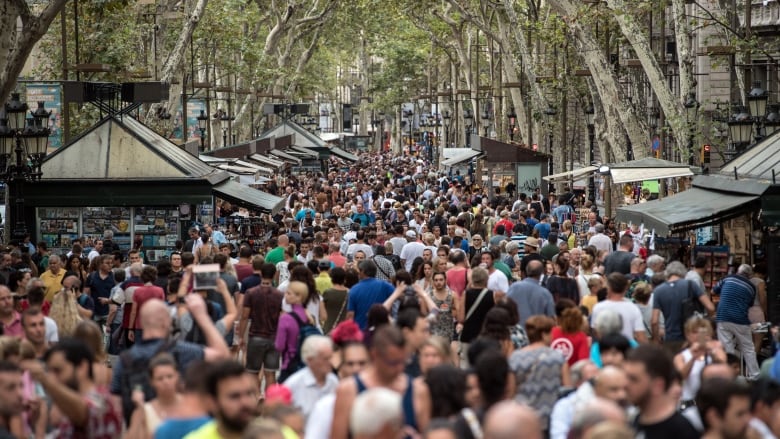How can we stop overtourism from ruining the world's great cities and natural wonders?

As a growing, global middle class gains increasing access to low-cost travel, residents in tourism hotspots, particularly in Europe and Asia, say they are overrun.
Housing costs are skyrocketing, driving out residents.
Infrastructure is overburdened.
The environment is suffering — and sometimes, residents say, so is local culture.
According to the United Nations, there were 1.3 billion international arrivals in 2017. Critics say that is already an unsustainable number.
[La Rambla] is now really kind of a no-go area for residents for about nine months of the year, because it's just so full of tourists.- Stephen Burgen
The Sunday Edition convened a panel on the subject of 'overtourism,' and while opinions varied, on one point there was unanimity: the way tourism is managed in much of the world needs to change, fast.
Barcelona is one city that's grappling with the implications of huge tourist numbers.
Stephen Burgen writes for The Guardian; he has lived in Barcelona for nearly two decades.
He told Michael Enright, host of The Sunday Edition, that when he first arrived in the city, there were fewer than 10 million annual visitors. Now, there are about 30 million tourists every year.
Burgen says certain areas, such as the famous La Rambla pedestrian boulevard, are clogged with tourists.
"[La Rambla] is now really kind of a no-go area for residents for about nine months of the year, because it's just so full of tourists."
In those neighbourhoods, Burgen says, businesses that formerly served local residents, such as dry-cleaners, are being driven out due to high rent and replaced by tourist-oriented services like bicycle-rental shops and tapas bars.
He says short-term, apartment-rental agencies like Airbnb are driving up housing costs, meaning many locals can't afford to live in the city any longer.

Elizabeth Becker, author of Overbooked: The Exploding Business of Travel and Tourism, says tourism is an immense, powerful industry that governments are struggling to regulate.
Supporters of tourism often point to the huge sums of money it can bring to local economies.
But Becker says the financial benefits aren't as large as people imagine.
Often, visitor dollars don't stay in the locale, but instead flow back to tourism operators based elsewhere.
When tourism creates jobs, they're often low-paying.
Cases where local politicians have figured out how to control the industry are rare.
"My favourite city example is Bordeaux, France, where a mayor reconfigured his city, thinking of tourism to benefit the people and to replace their old industry of shipping ... but did it in such a way that the money stayed in Bordeaux," Becker said.
We always say 'there is not overtourism, there is bad management.- Sandra Carvao, UNWTO
She says policy makers have to beware of too much "fly-by tourism," such as cruise ships, where visitors arrive at a destination, use the infrastructure but spend very little money locally, then leave.
Sandra Carvao works with the United Nations World Tourism Organization, and oversaw the recent report, "Overtourism?' Understanding and Managing Urban Tourism Growth Beyond Perceptions."
Carvao says much of the frustration associated with tourism in places like Barcelona has to do with how tourists congregate in specific areas.
"We always say 'there is not overtourism, there is bad management.' And that comes to the issue of concentration, because you probably have businesses three streets away which are not benefiting while you have others which might be overcrowded."
Carvao's report recommends that policy makers find ways to divert visitors from areas that are oversaturated, to places that have yet to significantly benefit from tourism dollars.
Click "listen," above, to hear the discussion.